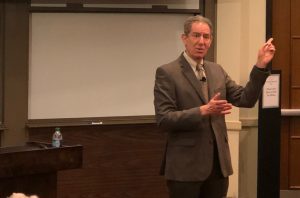
In his role as Vice President for Research at the University of Texas, Dr. Daniel Jaffe has developed instruments used to expand our knowledge of the universe. Why, he asks, “don’t I have a Nobel Prize?”
This was one of the provocative questions posed to an audience at UT recently, when Jaffe delivered a talk entitled “Disruptive Astronomy.”
He began by focusing on three critical discoveries that disrupted the status quo of astronomy, which is one of the reasons it is the most exciting of the sciences. Going back to the early 1960s, he identified the Big Bang remnant discovery as the first of these disruptive events. Two astronomers named Arno and Penzias made what is widely considered to be the biggest discovery of all time. But it wasn’t easy.
“You really have to work very hard in this business to be a success. Arno and Penzias had to clean pigeon poop off the surface of the radio telescope antenna,” to reduce the noise so they could find the Big Bang signal. Leading off with this bit of astronomical humour set the tone for the rest of the talk, which next explored the discovery the expansion of the universe is accelerating. “We still don’t understand what this is but we have a name for it – dark energy. This has led to a large investment in experiments.”
One of these, dubbed DESI, is being used at Mt. Locke in west Texas. It is comprised of 100 spectrographs to find distant galaxies, “and allows us to project them in 3D space and watch these structures evolve.” The structure apparent at just 300,000 years after the Big Bang is helping researchers explore this mysterious energy.
The final disruptive event Jaffe discussed was the discovery of planets around other stars. With the Kepler telescope in Earth orbit, “we have found a whole zoo of new planets.”
All of which led to what he termed “Jaffe’s Question: I’m inventing new technology and I’m stubborn. Why don’t I have a Nobel Prize?”
The basic answer is that Nobel prizes are awarded for discoveries, but the people who create the instruments needed to make those discoveries don’t get a prize. Jaffe is pioneering micromachined silicon diffractive optics. He has built an instrument that is being used on the 107-inch telescope operated by UT. He said the best way to gain “a technical edge” over really big telescopes is to use mid-size telescopes like the 107-inch on long term projects. By doing so, he has made the 107-inch “more capable than the Keck telescope in Hawaii,” one of the world’s largest.
“One of our devices is launching with the Webb Space Telescope next year, and a more capable instrument will be on the Magellan telescope.” When finished in about 4 years, the Magellan (in Chile) will be the world’s largest.
“This will push us into the critical regime from detecting to understanding new planets,” explained Jaffe. Perhaps that will be the next era of disruptive astronomy.
For more details on Dr. Jaffe’s instrument, visit this link:
http://www.as.utexas.edu/astronomy/research/people/jaffe/micro_si_diff.html
Photo with this article by Dr. C. Cunningham
